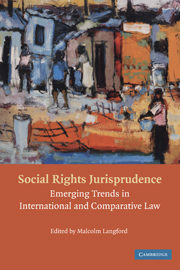Book contents
- Frontmatter
- Contents
- Foreword – Philip Alston
- Preface
- PART ONE OVERVIEW
- PART TWO SELECT NATIONAL JURISDICTIONS
- 4 South Africa
- 5 India
- 6 South Asia
- 7 Colombia
- 8 Argentina
- 9 Brazil
- 10 Venezuela
- 11 Canada
- 12 The United States
- 13 Hungary
- 14 France
- 15 United Kingdom
- 16 Ireland
- PART THREE REGIONAL PROCEDURES AND JURISPRUDENCE
- PART FOUR INTERNATIONAL HUMAN RIGHTS PROCEDURES AND JURISPRUDENCE
- PART FIVE SPECIAL TOPICS
- Notes on Contributors
- Table of Authorities
- Index
- References
10 - Venezuela
A Distinct Path Towards Social Justice
Published online by Cambridge University Press: 05 June 2012
- Frontmatter
- Contents
- Foreword – Philip Alston
- Preface
- PART ONE OVERVIEW
- PART TWO SELECT NATIONAL JURISDICTIONS
- 4 South Africa
- 5 India
- 6 South Asia
- 7 Colombia
- 8 Argentina
- 9 Brazil
- 10 Venezuela
- 11 Canada
- 12 The United States
- 13 Hungary
- 14 France
- 15 United Kingdom
- 16 Ireland
- PART THREE REGIONAL PROCEDURES AND JURISPRUDENCE
- PART FOUR INTERNATIONAL HUMAN RIGHTS PROCEDURES AND JURISPRUDENCE
- PART FIVE SPECIAL TOPICS
- Notes on Contributors
- Table of Authorities
- Index
- References
Summary
INTRODUCTION: PARTICIPATORY DEMOCRACY AND A SOCIAL-ORIENTED ECONOMY
In the late 1980s and throughout the 1990s, a longstanding economic crisis led to the adoption of neo-liberal policies, which included the ongoing privatisation of public services. In 1999, new political forces were elected into government, which triggered a process for the drafting of a new Constitution. In reaction to neo-liberal policies, the 1999 Constitution of the Bolivarian Republic of Venezuela promotes a distinct path for the country in which the concept of social justice plays a central role.
The new Republic is based on the development of a democratic ‘Social State of Law and Justice’. Proclaiming justice, equity and human rights among its superior values (article 2), the Constitution sets the respect of human dignity and the fulfilment of constitutional rights and duties among its purposes (article 3). The extensive rights charter includes comprehensive recognition of human rights and several guarantees for their realisation, including the establishment of institutions for ensuring due process and the constitutional recognition of international human rights law. The Constitution develops a comprehensive regime for the protection and promotion of human rights by the State, but it also establishes the principles of social cooperation, solidarity and co-responsibility of all members of society and the State in the fulfilment of constitutional purposes (article 4).
One of the most outstanding features of the new Constitution is the redesign of the structure of public powers.
- Type
- Chapter
- Information
- Social Rights JurisprudenceEmerging Trends in International and Comparative Law, pp. 192 - 208Publisher: Cambridge University PressPrint publication year: 2009

